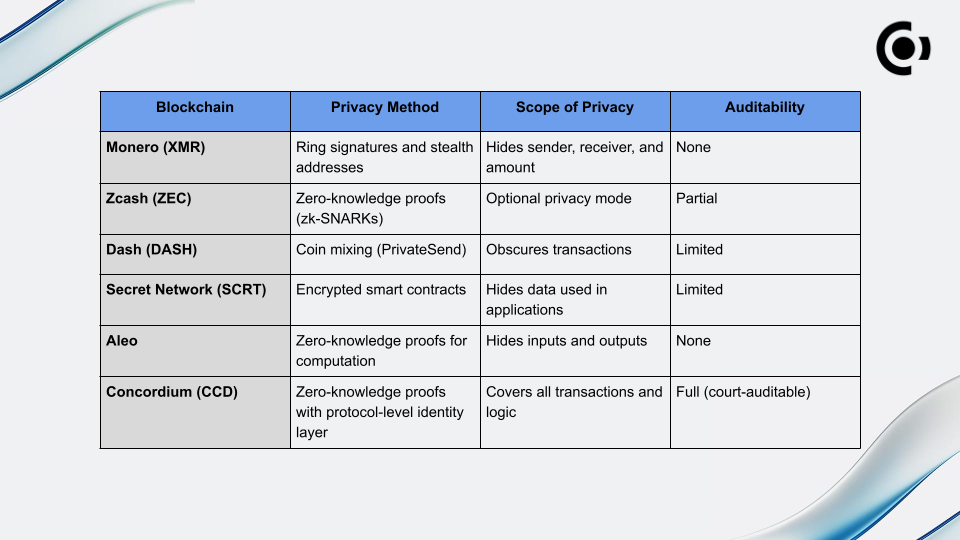As the global debate over anonymity, self sovereignty, and regulation intensifies, next-gen privacy chains must show that privacy and accountability can coexist.
User privacy is paramount, but so is accountability. After years of restrictive policy, the political tide is turning. The 2025 U.S. administration has signaled a pivot in its crypto posture, one that suggests that cryptographic privacy and legal compliance can and must coexist. Executive orders have encouraged “innovation-friendly” interpretations of anti-money-laundering standards, while enforcement priorities have shifted from cracking down on developers of infrastructure to demonstrable misuse.
Across the Atlantic, the European Union’s upcoming MiCA privacy amendments – effective 2027 – will still prohibit trading of privacy coins unless there is traceability and verifiability built into the assets. The decision follows a pattern already visible in the market: Binance delisted Monero globally in early 2024, Kraken withdrew privacy tokens from its European offering in October, and nearly sixty similar removals occurred across major exchanges that year.
Despite loosening the reins, privacy chains continue to face regulatory pressure, but not because regulators fail to recognize the legitimacy of verifiable confidentiality. Rather, most existing architectures are not designed with auditability in mind.
This moment defines a narrow window for innovation. Privacy coins like Monero, Zcash and Dash have seen recent surging inflows and high on-chain activity, indicating that privacy is not a fringe ideal, but a core market demand. Yet, the next era of blockchain privacy requires more than concealment – it requires verifiable trust. Early architectures like Monero, Zcash, Secret Network, and Aleo laid the foundation for private transactions. Concordium now moves the field forward by fusing cryptographic privacy with built-in identity verification.
Anonymity as Protection
The first privacy chains emerged to protect users from public traceability. Monero and Zcash became synonymous with full anonymity. Monero conceals senders, receivers, and amounts using stealth addresses, ring signatures, and Ring Confidential Transactions. Zcash employs zero-knowledge proofs, or zk-SNARKs, to verify transactions without revealing details, giving users an option between transparent and shielded transfers.
These approaches created strong privacy for individuals but no visibility for institutions. Transactions could not be audited or linked to verified entities, which led regulators to treat them as high-risk assets. Exchanges in multiple regions restricted or removed trading to avoid anti-money-laundering exposure. In effect, the achievement of total privacy came at the cost of participation in popular exchanges.
The Era of Private Computation
Newer privacy chains expanded beyond transactions into application logic. Secret Network and Aleo use different methods to protect computation itself. Secret Network encrypts smart-contract data inside hardware enclaves, while Aleo applies zero-knowledge proofs (ZKPs) to keep inputs and outputs hidden while maintaining mathematical correctness. Both models enable private decentralized applications that handle sensitive information securely.
However, users remain cryptographic keys, not verified actors. Privacy is extended to computation, though verification remains outside the protocol. This leaves the same unresolved challenge: strong cryptography without a mechanism for lawful oversight.
Concordium Delivers Privacy with Accountability

Concordium has redefined what privacy means in blockchain, turning it from a risk to a valuable feature that unifies confidentiality and accountability. Every user account is mandatorily linked to a verified real-world identity through a trusted independent identity provider (IDP), while personal data stays encrypted and off-chain within the user’s wallet.
Via ZKPs, users can prove who they are or specific attributes, such as age or jurisdiction, while maintaining confidentiality. If a legal authority presents valid grounds, an authorized privacy guardian can enable disclosure but only under a Swiss court order. This novel architecture simultaneously delivers privacy by default and auditability when required. For users, enterprises and regulators alike, it’s the missing link that bridges confidential digital sovereignty and trusted accountability — the conditions needed for large-scale adoption across industries.
Both Sides of the Spectrum
As the demand returns to privacy chains amid global uncertainty, one thing is clear: the market is shifting away from secrecy, towards trusted privacy. Fully anonymous systems risk isolation, while completely traceable chains expose users to surveillance. The winning model will satisfy both sides of the spectrum: user privacy and institutional accountability.
Concordium already delivers that balance. Its built-in identity layer preserves user privacy through cryptography and supports compliance through zero-knowledge verification, ensuring privacy and accountability can, in fact, coexist.
Learn more about privacy and identity on Concordium.
Join the PayFi revolution, follow us on X.


.webp)